Hardship: Daily Petrol Consumption Crashes by 92% Under Tinubu — Report
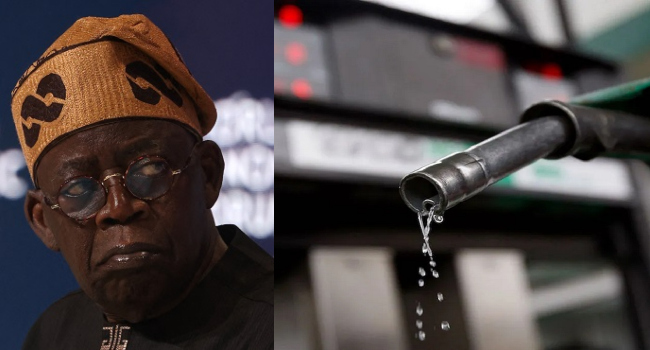
Daily consumption of Premium Motor Spirit (PMS) or petrol in Nigeria has dropped drastically under one year after President Bola Tinubu assumed office on May 29, 2023.
Data obtained by Channels Television from the Nigerian Midstream and Downstream Product Regulatory Authority (NMDPRA) Daily Truck Out Report for September 2024, showed that consumption as of August 20, 2024, was 4.5 million litres per day.
The daily petrol consumption as of May 2023 was 60, 000 million litres per day, according to the NMDPRA.
An estimation brings daily consumption down by 92 per cent after May 29, 2023.
Analysis of the report, shockingly, revealed that out of the 36 states of the federation, only 16 states got product allocation from the Nigeran National Petroleum Company Limited (NNPCL) in the month under review.
This meant that those states that did not get product allocation suffered scarcity in August.
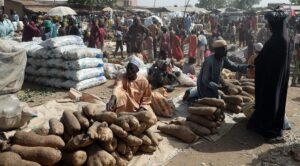 |
| General view of the market in Jibia on February 18, 2024. – Nigeria, which shares 1,600 km of border with its neighbor, was until now one of Niger’s main trading partners with $193 million in exports in 2022 according to the United Nations (electricity, tobacco, cement, etc). Since the border closure, it has even been a double whammy for the local population, who have seen food prices explode under the combined effect of new movement restrictions and galloping inflation after the Nigerian president , Bola Ahmed Tinubu, in office since May, implemented economic reforms which plunged the country into crisis. (Photo by Kola Sulaimon / AFP) |
A breakdown of how NNNPCL distributed the products among the 16 states, showed that Niger got the highest allocation of 21 trucks, amounting to 940, 000 litres daily, Lagos got the second highest of 12 trucks amounting to 726, 001 litres, and Kaduna got 12 trucks of 454, 001 litres.
Other states such as Oyo got 12 trucks of 454 litres, Kano 9 trucks, Ondo 6 trucks, Kwara 6 trucks, Edo 4 trucks, and FCT 4 trucks.
The likes of Sokoto state received 4 trucks from the NNPCL, Ogun state got three trucks, Osun three, Gombe one, Benue one, Ekiti one and Kebbi, one truck.
President Tinubu on May 29, 2023, declared an end to petrol subsidies, which at that time had gulped about N12tn in 10 years.
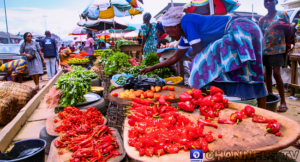 |
| A file photo of a food trader at a market in Akure, the Ondo State capital. Sodiq Adelakun/Channels Television. |
According to the president, payment of petrol subsidies was no longer sustainable as it had plunged the country into huge debts.
Petrol price has since skyrocketed from N195 per litre to about N1300 per litre, pushing up headline inflation to an almost three-decade high of 34.19 per cent in June. It has since slowed to 32.7 per cent in September.
The cost of living has also risen, plunging 129 million Nigerians into poverty, according to the latest data by the World Bank.
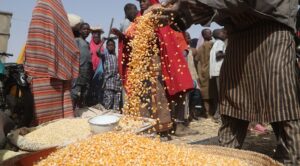 |
| Maize is displayed by a trader at the market in Jibia on February 18, 2024. – Nigeria, which shares 1,600 km of border with its neighbor, was until now one of Niger’s main trading partners with $193 million in exports in 2022 according to the United Nations (electricity, tobacco, cement, etc). Since the border closure, it has even been a double whammy for the local population, who have seen food prices explode under the combined effect of new movement restrictions and galloping inflation after the Nigerian president , Bola Ahmed Tinubu, in office since May, implemented economic reforms which plunged the country into crisis. (Photo by Kola Sulaimon / AFP) |
According to the global financial body, the over 129 million Nigerians represented a sharp rise from 40.1 per cent in 2018 to 56 per cent in 2024.
The World Bank report read, “With growth proving too slow to outpace inflation, poverty has risen sharply. Since 2018, the share of Nigerians living below the national poverty line16 is estimated to have risen sharply from 40.1 per cent to 56.0 per cent.
“Combined with population growth, this means that some 129 million Nigerians are living in poverty. This stark increase partly reflects Nigeria’s beleaguered growth record. Real GDP per capita has not recovered to the level it was at prior to the oil price-induced recession in 2016.
“The COVID-19 pandemic compounded this drop in economic activity. Moreover, growth is failing to outpace inflation: large increases in prices across almost all goods have diminished purchasing power.”
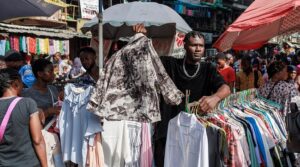 |
| A man waits for costumers while selling clothes at his stall in the Balogun Market in Lagos on December 18, 2023. – Christmas and year-end celebrations are marred by the economic crisis and soaring prices in Nigeria. Poverty in the most populous country in Africa has risen in 2023, affecting 104 million people, compared to 79 million five years earlier, according to the World Bank. The prices of food items and basic goods have skyrocketed following an increasing inflation rate and devaluation of the Naira, making daily life increasingly difficult for millions of Nigerians. (Photo by Benson Ibeabuchi / AFP) |
It added, “Multiple shocks in a context of high economic insecurity have deepened and broadened poverty, with over 115 million Nigerians estimated to have been poor in 2023. Since 2018/19, an additional nearly 35 million people have fallen into poverty, so that more than half of Nigerians (51.1 per cent of the population in 2023) are now estimated to live in poverty.”
A related report by a foreign news medium, AFP, also detailed how Nigerians have since abandoned their cars as a result of the pounding hardship.
“I parked it at my son’s house. I use public transport now,” Emmanuel, a 72-year-old retired health worker, told AFP. “It is not convenient, but it is what the economy demands.”
Car dealers in Lagos and Abuja told AFP that they had seen more and more people trading their fuel-guzzling cars and sports utility vehicles (SUVs) for more efficient vehicles to cut costs.
“People are actually selling their big cars these days,” Maji Abubakar, a car dealer in Abuja, told AFP. “The problem is that even if you put them on the market, there isn’t much demand for them.”
“It has been more than a year since I sold a car with an eight-cylinder engine, and the major reason is the price of petrol,” he added.
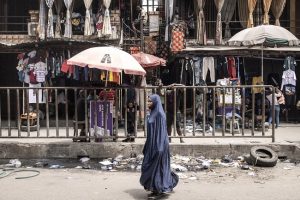 |
| A woman walks through a market street along Lagos island in Lagos on February 18, 2023, ahead of the Nigerian presidential election scheduled for February 25, 2023. (Photo by JOHN WESSELS / AFP) |
Do you have any information you wish to share with us? Do you want us to cover your event or programme? For Adverts or report call/WhatsApp us on +2349064433505 or reach us at infokwarareporters@gmail.com







No comments